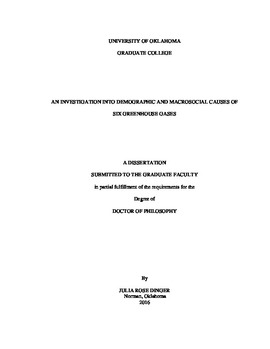| dc.description.abstract | The single largest ecological crisis facing the world in the coming century is the problem of climate change and its impacts. The state of the world today is the direct result of the history of unequal exchange between wealthy and poor nations, with the footprints of colonization left behind in patterns of unequal trade relationships between high income and low income countries. The crisis of climate change requires a shift in thinking about the social world and the natural world as separate spheres and instead, we must view society as embedded within the natural environment, and acknowledge society’s impact on the environment. While climate change impacts must be understood within the context of environmental and climate justice, where social justice intersects with differential access to safe environments. So too must the social structural factors which drive greenhouse gas emissions and their theoretical underpinnings must be analyzed to investigate their relative predictive power to predict greenhouse gas emissions. This research expands upon the body of literature regarding the structural anthropogenic factors which drive greenhouse gas emissions, and improves our understanding of these relationships by analyzing all of the major greenhouse gases including the understudied halogenated species through the lenses of four distinct but related bodies of social theory regarding environmental outcomes including structural human ecology, ecologically unequal exchange, world-system, and world polity theory. I find that structural human ecology factors, when accounting for position within the world-system, serves to predict greenhouse gas emissions, and that civil society predicts an inverse relationship. I close with practical implications based on these findings, including divestment strategy and cap and trade policy. | en_US |
